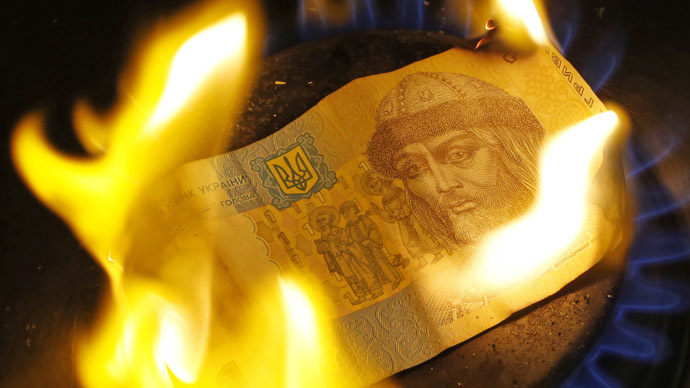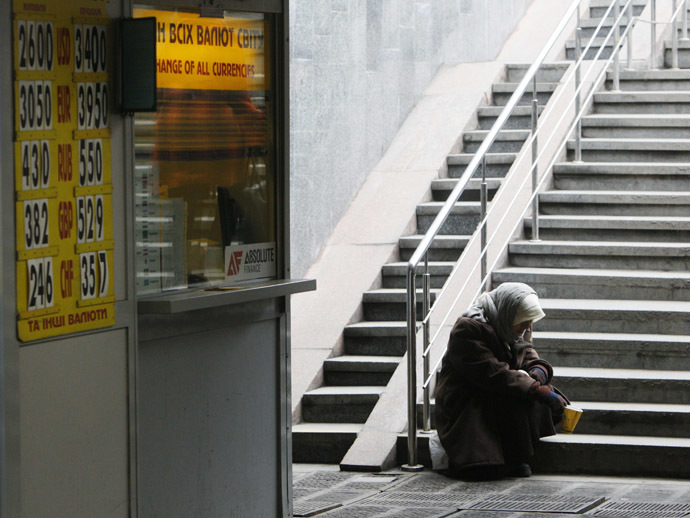Kiev's new plan to avoid collapse? Ban Russian cartoons!

Ukraine’s economy is close to collapse as its banking system falls apart. Rather than facing fiscal reality, its hyper-nationalist government has prioritized banning Russian cartoons.
If present-day Ukraine didn't exist, I’m not sure JRR Tolkien could have conjured it for one of his legendary fantasy novels. This weekend, the war-torn country’s economy precariously tottered on the precipice of oblivion. Meanwhile, Kiev’s Razumkov Center published a poll which reported that close to 70 percent of Ukrainians believe the country is headed in the wrong direction and only 5 percent strongly back its current administration.
The bad news for the post-Maidan regime doesn’t end there. Less than 12 months since assuming office, President Petro Poroshenko’s approval rating is now 33 percent, according to a second poll from Razumkov. Disturbingly, their findings suggest that only 12.6 percent of respondents fully support the oligarch.
His prime minister, Arseniy Yatsenyuk, fares even worse. Only 7.8 percent expressed complete satisfaction with his performance. Worryingly for the PM, who last week was described as "the most dangerous man in Europe” by British academic Richard Sakwa, 68 percent actively disapprove of his work in government. It's an astounding fall from grace for Yatsenyuk, famously handpicked by the US State Department’s Victoria Nuland to head up a pro-Washington regime after last year’s coup.
So far, so deja vu. The Orange Revolution appears to be repeating itself in fast-forward. In 2005, a year after mass street protests, Viktor Yushchenko enjoyed ratings of 60 percent plus. By 2010, he polled a mere 5 percent and could only watch as the subsequently ousted president, Viktor Yanukovich, took power.
It’s worth noting that the government has almost complete control of (or support from) Ukraine’s media, making its devastating poll numbers even more startling. Billionaire Poroshenko personally owns the Channel 5 TV network and the other leading channels are the playthings of friendly fellow-oligarchs. Additionally, there is not much of an opposition to speak of.

Ukraine on the brink
The only explanation for the regime’s calamitous ratings is the economic crisis. The same emergency the west chooses to ignore. Ordinary Ukrainians are realizing that, rather than heralding a bright future, the Maidan movement has in fact destroyed the country. A nation that was already poor by comparison with its Russian and EU neighbors is now impoverished by collation with many African states. This is a tragedy.
Ukraine’s currency, the hryvnia, has fallen by 66.5 percent since January 2014. Even more horrendously, the average worker’s salary has declined to $120 a month. Only 18 months ago, before the first Maidan protests, it was $405. Regardless of what is happening in austerity-hit Europe, Yatsenyuk and Poroshenko have led Ukrainians to the poorhouse.
Rating agency Moody's reports that 12 Ukrainian banks have lost their licenses since January, on top of the 17 banks that lost them last year. In a futile attempt to halt the hryvnia plunge, interest rates were raised to 19.5 percent last month. Amidst all this, around 40 percent of Ukraine’s bank loans are denominated in foreign currency (almost all euros or dollars).
Furthermore, Rostislav Balaban, a lecturer at the National University of Kiev-Mohyla Academy, has suggested that the cost of bribes has doubled. While lamentable, this is a very urgent matter in a country where almost every interaction with the state apparatus, from securing kindergarten places to obtaining medical surgery, requires the greasing of palms.
And now, a bit of Ukrainian humor: "Anti-corruption" PR campaign backfires: the going rate of bribes has doubled! pic.twitter.com/zfK85IpYTJ
— NedoUkraïnka (@ValLisitsa) March 29, 2015
A government working for recovery?
With all this gloom circling, you’d expect Poroshenko and Yatsenyuk to have a carefully crafted plan to pull Ukraine back from the brink, wouldn’t you? Alas, in a sure sign that he inhabits a different universe from ordinary Ukrainians, the PM seems more concerned about Kiev’s putative accession to NATO than the impending collapse of his economy. Sadly for Nuland's pet, that pipe-dream was kyboshed at the weekend by former US National Security Advisor Zbigniew Brzezinski.
“Should [Ukraine] join NATO in future? It is generally not necessary. Perhaps even harmful," Brzezinski said in an interview with a Polish newspaper. Given that Brzezinski literally wrote the book (The Grand Chessboard) on US policy in the post-Soviet space, it’s fair to say that Washington's thinking isn't far behind. Yatsenyuk is away with the fairies.
Meanwhile, Nikolai Gordienko, Ukraine’s chief anti-corruption official, alleges that Yatsenyuk’s officials fired him after he uncovered $1 billion in theft by the post-coup administration “Corruption schemes in Ukraine are headed by the government of Yatsenyuk,” Gordienko claimed. In a wonderful case of karma, it appears that the Maidan crew wanted to expose fraud committed by the previous Yanukovich government, but the audits also uncovered their own fumbling in the greasy till.
Kiev's culture wars
Attempting to deflect attention from the chaos, the regime has suddenly intensified its Russia-bashing. The present government is dominated by Ukrainian speakers from the western provinces. After events of the past 12 months, it’s surely in their interests to attempt a rapprochement with the Russophone south and east.
However, Poroshenko’s pro-US regime has another plan. Instead of devoting every waking hour to the fiscal crisis, they have introduced a law which prohibits the showing of "any Russian films, documentaries, serials or cartoons" made since January 2014 or any productions portraying "the aggressor country" (Russia) in a favorable light made after August 1991 (when Soviet hardliners attempted to overthrow Gorbachev)."
At a time when the very viability of the Ukrainian economy is in question, the best policy Poroshenko can muster is to ban Russian cartoons. Presumably, his minions are also working on a memory-wiping machine for adults?
Russian culture is a fact of life in Ukraine. Almost everybody - even radical nationalists - can speak Russian. Prohibiting Russian cartoons, reality shows and soap operas won't change that.
For Ukraine to survive, the country’s fractured unity must be somehow restored. However, if the current regime continues its petty policy of cultural one-upmanship, they are signing their own political death warrants. For most Ukrainians, the economy will ultimately dictate the success or failure of the Maidan project. Right now, it's not looking good.
The statements, views and opinions expressed in this column are solely those of the author and do not necessarily represent those of RT.
The statements, views and opinions expressed in this column are solely those of the author and do not necessarily represent those of RT.












